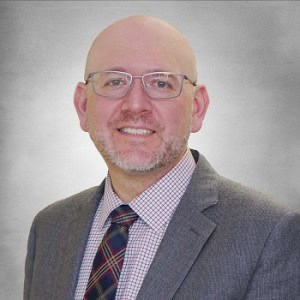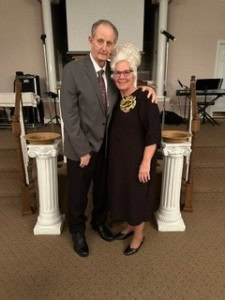When Nathan McCormack was diagnosed with a rare form of cancer, he needed a complex surgical procedure that isn’t available at all hospitals.
As an academic medical center, Regional One Health Cancer Care was able to offer the care Nathan needed.
Surgical oncologist Dr. Evan Glazer led a team that successfully operated on Nathan, giving him a chance to get back to preaching at his church, working, and spending time with loved ones.
Nathan McCormack went from a busy life focused on church, family, and work to staring down an all-day surgery for a rare cancer. In a moment, his world turned upside-down.
Nathan and wife Brenda relied on their faith and the expertise of Dr. Evan Glazer and Regional One Health Cancer Care to find a path forward. In order to navigate their unexpected journey, “We trusted in God, and with God and Dr. Glazer’s help, he made it through,” Brenda said.
Nathan was referred to Dr. Glazer, a surgical oncologist at Regional One Health Cancer Care and associate professor of surgery at University of Tennessee Health Science Center, for a higher level of cancer care than what could be performed closer to his home. It is known as tertiary care – advanced, specialized care that is not routinely offered in all regions or hospitals. It is part of what Regional One Health Cancer Care offers every day as an academic medical center.
A cancer diagnosis is the last thing Nathan expected when he went for a checkup last year. He had recently tripped and fallen, however, and his doctor didn’t like the look of the bruise.
“She did a scan, and two days later, they called and said, ‘You need to get back up here,’” Nathan recalls. “We saw more doctors, and they all said the same thing – I had cancer. It was a shock. I had no pain. I wasn’t sick. I went to work every day, and I went to church every night to preach.”
He had a rare cancer known as low-grade appendiceal mucinous neoplasms, or LAMN. It is not uncommon for patients to experience no symptoms, which often means the cancer has spread by the time it is discovered. This was the case for Nathan, and he was told he likely needed surgery.

Dr. Evan Glazer and his team provide access to complex procedures. “We can combine the medical expertise of a multidisciplinary group of physicians with a location that has the resources to do major, complex operations at a very high level,” he said.
Nathan struggled with the idea of undergoing a major procedure when he wasn’t even feeling ill.
Brenda remembers an emotional conversation with his doctor: “I was crying, and she told me, ‘I’ll get you to a surgeon, and he can help you decide what to do.’”
A challenge remained in finding the right team at the right place for Nathan.
Although the couple’s Dyersburg home is closer to Nashville, the doctor recommended traveling to Memphis to see a team of providers, including Dr. Glazer.
Dr. Glazer is an expert in liver, pancreatic, and hepatobiliary cancers. As an academic surgical oncologist with UTHSC and participant in national panels that establish treatment guidelines, his team has the advanced experience and training to offer cutting-edge treatment options. This, combined with the world-class patient care resources at Regional One Health, allows him to offer complex surgeries, treatments, and care not available everywhere.
That is essential for LAMN, which often doesn’t respond to traditional treatments like standard chemotherapy.
In LAMN, cancer cells grow inside the intraperitoneal (abdominal) cavity, which includes the stomach, intestines, bladder, liver, and other organs.
Instead of growing into one of the organs, tumors grow around them: “You have cancer cells growing in essentially a water balloon,” Dr. Glazer explained, noting the organs are held in a balloon or sac made up of our skin and muscles, i.e. the abdominal wall.

Nathan and Brenda McCormack are grateful for the advanced care Dr. Glazer provided. “We realize it’s a miracle we found the cancer as soon as we did, and that he was able to get treated. It could have been a whole different ending,” Brenda said.
“To treat the cancer, we start by making an incision and removing the cancer cells that are living on top of the organs inside the cavity or inside the belly.”
Sometimes, there are microscopic cancer cells that can’t be removed surgically. Research found these cells can be killed by circulating chemotherapy in the intraperitoneal cavity with a pump, and that raising the temperature of the chemotherapy slightly makes it even more effective.
“That series of observations and research became a procedure called HIPEC, or Hyperthermic Intraperitoneal Chemotherapy,” Dr. Glazer said.
The treatment requires a team of surgeons, nurses, surgical technologists, and other health care providers. “HIPEC is a major, all-day surgery, so a lot of time is spent determining if it’s the right procedure for the right patient at the right time,” Dr. Glazer said.
“It is ideal when a patient’s cancer has a high likelihood of spreading and when the treatment has a good chance of extending the patient’s life and improving their quality of life.”
At Regional One Health Cancer Care, a team of board-certified surgical and medical oncologists and other specialists make that recommendation. They discuss treatment guidelines and develop a strategy based on the specific diagnosis, risks to the patient, and risk of the cancer worsening.
In Nathan’s case, they determined HIPEC was the best option.
In April, the team performed a 10-hour surgery to remove his appendix, gallbladder, spleen, part of the colon, and tumors in the abdominal lining, and to administer chemotherapy with a multidisciplinary team. Multiple members of the UTHSC team, including surgical oncologist Dr. Ian Solsky, worked together to take care of Nathan.
“He had surgery on a Thursday, and he went home the next Thursday. That Sunday, he was in Sunday school!” Brenda said. “Dr. Glazer was extremely professional, and the nurses were excellent. They kept us informed, and everyone treated us very well.”

Dr. Glazer performed an all-day operation known as HIPEC. First, he surgically removed cancer cells living on top of the organs inside the abdominal cavity. Then, the team addressed any remaining microscopic cancer cells by circulating chemotherapy in the cavity with a pump.
Dr. Glazer said his team is proud to make advanced treatments like HIPEC easier for patients to access. “We’re one of two hospitals in this area that offers this procedure, which means more patients can be served here in Memphis,” he said. “Previously, a lot of patients would have had to travel to access this type of care, and now they don’t.”
He said the procedure is an example of how the partnership between UTHSC and Regional One Health raises the level of care in the community.
“We’re able to do complex surgeries like these because we’re an academic medical center. We can combine the medical expertise of a multidisciplinary group of physicians with a location that has the resources to do major, complex operations at a very high level,” he said.
“That synergy is allowing us to deliver on the promise of how an academic medical center raises the level of care for the entire community.”
Now, Nathan will continue to see Dr. Glazer for surveillance, but otherwise isn’t expected to need ongoing treatment. The Regional One Health team will work with his medical oncologist closer to his home to provide surveillance, which is personalized for each patient and includes CT scans and blood work on a regular basis to look out for cancer recurrences or problems.
For Nathan and Brenda, it’s a chance to get back to normal.
“We have three children in their 40s and four grandkids, and we have our church family too,” Brenda said. “He’s excited about getting back to preaching, back to work and just getting our life back together. We realize it’s a miracle we found the cancer as soon as we did, and that he was able to get treated. It could have been a whole different ending.”
To learn more, visit regionalonehealth.org/cancer-care/ or call 901-515-HOPE (4673).